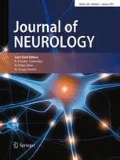Abstract.
Depression occurs in approximately 45% of all patients with Parkinson’s disease (PD), reduces quality of life independent of motor symptoms and seems to be underrated and undertreated. Characteristics of symptoms differ from major depression. Because of overlapping clinical symptoms, diagnosis is based on subjectively experienced anhedonia and feeling of emptiness. Available rating scales for major depression may not be adequate to correctly measure severity of depression in PD. Anxiety and depression may manifest as first symptoms of PD many years before motor symptoms. Serotonergic, noradrenergic and dopaminergic mechanisms play key roles in the etiology of depression in PD. Tricyclic and newer, selective antidepressants including serotonin and noradrenaline reuptake inhibitors (SSRI, SNRI) appear to be effective in treating depression in PD. Selective reuptake inhibitors seem to have a favorable side effect profile. Recent controlled studies show antidepressant effects of pramipexole in bipolar II depression. New dopamine agonists pramipexole and ropinirole appear to ameliorate depressive symptoms in PD in addition to effects on motor symptoms. There is a lack of appropriate rating scales and controlled studies regarding depression in PD.
Similar content being viewed by others
References
Cummings JL, Masterman DL (1999) Depression in patients with Parkinson’s disease. Int J Geriatr Psychiatry 14:711–718
Kumar R, Krack P, Pollak P (1999) Transient acute depression induced by highfrequency deep-brain stimulation. N Engl J Med 341:1003–1004
Lemke MR (2002) Effect of reboxetine on depression in Parkinson’s disease. J Clin Psychiatry 63:300–304
Lemke MR (1999) Motor signs of depression. Nervenarzt 70:600–612
Lemke MR, Brecht HM, Koester J, Kraus PH, Reichmann H (2004) Anhedonia, depression, and motor functioning in Parkinson’s disease during treatment with pramipexole. J Neuropsychiat Clin Neurosciences (in press)
Oertel WH, Ellgring H (1995) Parkinson’s disease-medical education and psychosocial aspects. Patient Educ Couns 26:71–79
Richard IH, Kurlan R (1997) A survey of antidepressant drug use in Parkinson’s disease. Parkinson Study Group. Neurology 49:1168–1170
Richard IH, Maughn A, Kurlan R (1999) Do serotonin reuptake inhibitor antidepressants worsen Parkinson’s disease? A retrospective case series. Mov Disord 14:155–157
Reichmann H, Brecht MH, Koster J, Kraus PH, Lemke MR (2003) Pramipexole in routine clinical practice: a prospective observational trial in Parkinson’s disease. CNS Drugs 17: 965–973
Author information
Authors and Affiliations
Corresponding author
Rights and permissions
About this article
Cite this article
Lemke, M.R., Fuchs, G., Gemende, I. et al. Depression and Parkinson’s disease. J Neurol 251 (Suppl 6), vi24–vi27 (2004). https://doi.org/10.1007/s00415-004-1606-6
Issue Date:
DOI: https://doi.org/10.1007/s00415-004-1606-6



